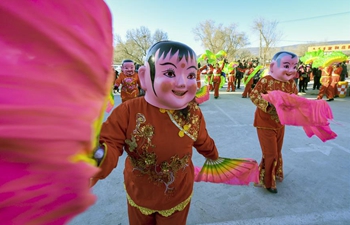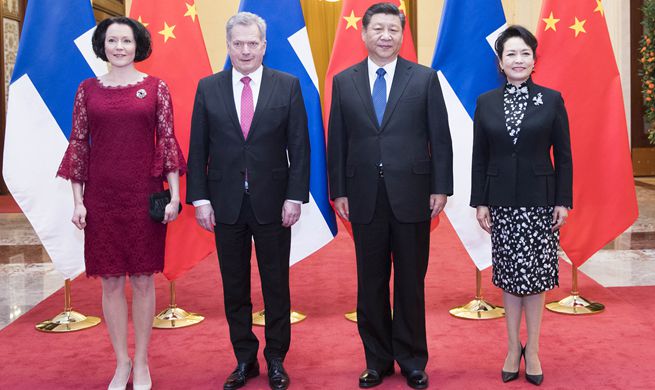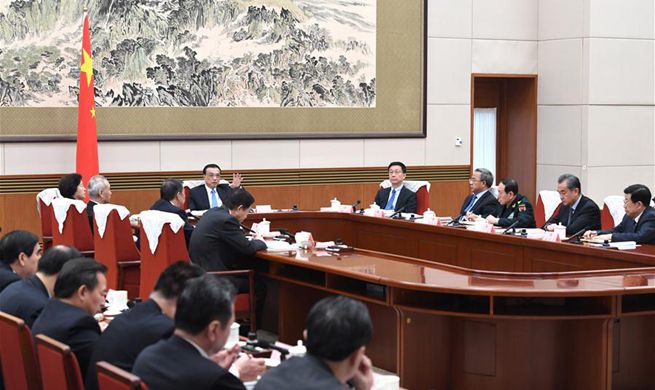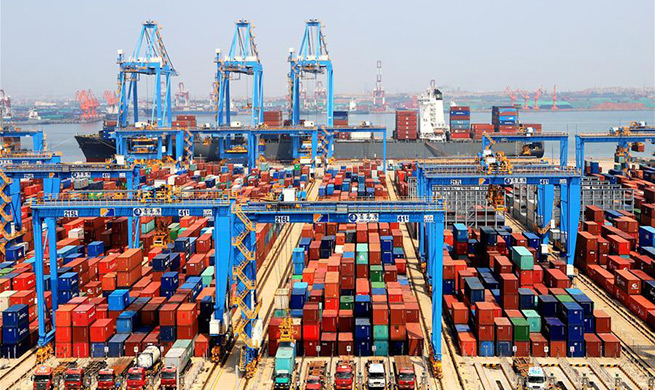by Olatunji Saliu
ABUJA, Jan. 14 (Xinhua) -- Kpaduma, an underdeveloped rural community at the edge of Abuja, Nigeria's capital, came alive Monday as its people turned out en masse in jubilation to welcome Chinese technicians and their local partners to launch a digital satellite television project.
The rustic community is one of the 1,000 villages carefully selected to benefit from a China-aid program that works on providing 1,000 Nigerian villages with the access to digital television. The program was officially launched Monday in Abuja.
StarTimes, a Chinese firm which offers direct-to-home pay TV services, introduced its digital television service to Kpaduma, to flag off the enormous project across Nigeria.
The project acts on one of the resolutions of the Johannesburg Summit of the Forum on China-Africa Cooperation (FOCAC) in 2015, in which the Chinese government pledged to provide satellite television for 10,000 African villages.
Under the project, each of the 1,000 chosen villages in Nigeria, Africa's most populous country, will receive two sets of solar-powered projector television systems and one set of solar 32-inch digital television integrated terminal system.
Altogether, 20,000 households in rural Nigeria will benefit from the project. In each village, 20 recipient families with television will be provided with 20 sets of direct broadcast satellite terminal system free of charge.
A projector television system will also be provided to each of the 1,000 villages, for viewers to publicly watch at least 21 satellite channels free of charge.
For decades, residents of Kpaduma have only been familiar with analog TV, lacking the opportunity to watch some of the exciting satellite television channels enjoyed by people in the towns and cities across Nigeria. When the innovative project came to their community Monday with Chinese and Nigerian officials in attendance, ecstatic locals in Kpaduma thronged the village square.
Yusuf Dio, the prince of Kpaduma and a beneficiary of the direct broadcast satellite terminal system, described the innovative project as "the talk of the town."
The satellite television provides the opportunity for locals to watch digital television programs with both local and international contents.
Every evening, up to 20 locals who had no television or lacked electricity gather at Dio's house to watch the digital television programs together with his family.
Dio, who welcomed Xinhua to watch the satellite television together with his family, said he enjoyed watching football and news channels the most, while his wife and three children love channels with entertainment contents.
"We are very happy to have this (digital television) in our household. It has brought so much joy and pleasure to my family," Dio told Xinhua.
As a pioneer digital terrestrial television provider in Nigeria, StarTimes has been able to disseminate digital terrestrial television in at least 80 cities across the West African country in nine years.
With its simple-to-install decoders coupled with its low tariffs, StarTimes, in partnership with the Nigerian Television Authority (NTA), has brought digital TV within the reach of many Nigerians since 2010.
StarTimes offers some of its channels in three main Nigerian languages -- Yoruba, Hausa, and Igbo, as well as a Chinese Kung Fu movie channel and Nollywood (Nigerian entertainment) channels, among others.
Speaking at the flag-off ceremony for the project in Kpaduma, Nigeria's Minister of Information and Culture Lai Mohammed said the implementation complements the efforts of the Nigerian government to "democratize access to information and entertainment through the Digital Switch Over (DSO) for television which has now been rolled out in several states and the Federal Capital Territory."
The minister commended the Chinese government for the project which, he said, will undoubtedly strengthen the already cordial China-Nigeria relations.
Mohammed urged StarTimes to expedite the installation of the television satellite system to cover the entire country, so that more people in the countryside will be more informed and entertained.
In his remarks, Chinese ambassador to Nigeria, Zhou Pingjian, reaffirmed the commitment of China to implementing the outcome of the FOCAC, saying China would work closely with Nigeria to ensure people's access to information through television and satellite technology.
Zhou said the implementation of the digital television project would also go a long way in delivering the China-Africa cooperation's goal of connectivity, especially people-to-people connectivity, one of the core objectives of the China-proposed Belt and Road Initiative.
Zhang Jin, managing director of StarTimes in Nigeria, said the implementation of the project will create more jobs, as Nigerians across the 1,000 selected villages have been trained on how to install, recharge and operate the satellite television system.













